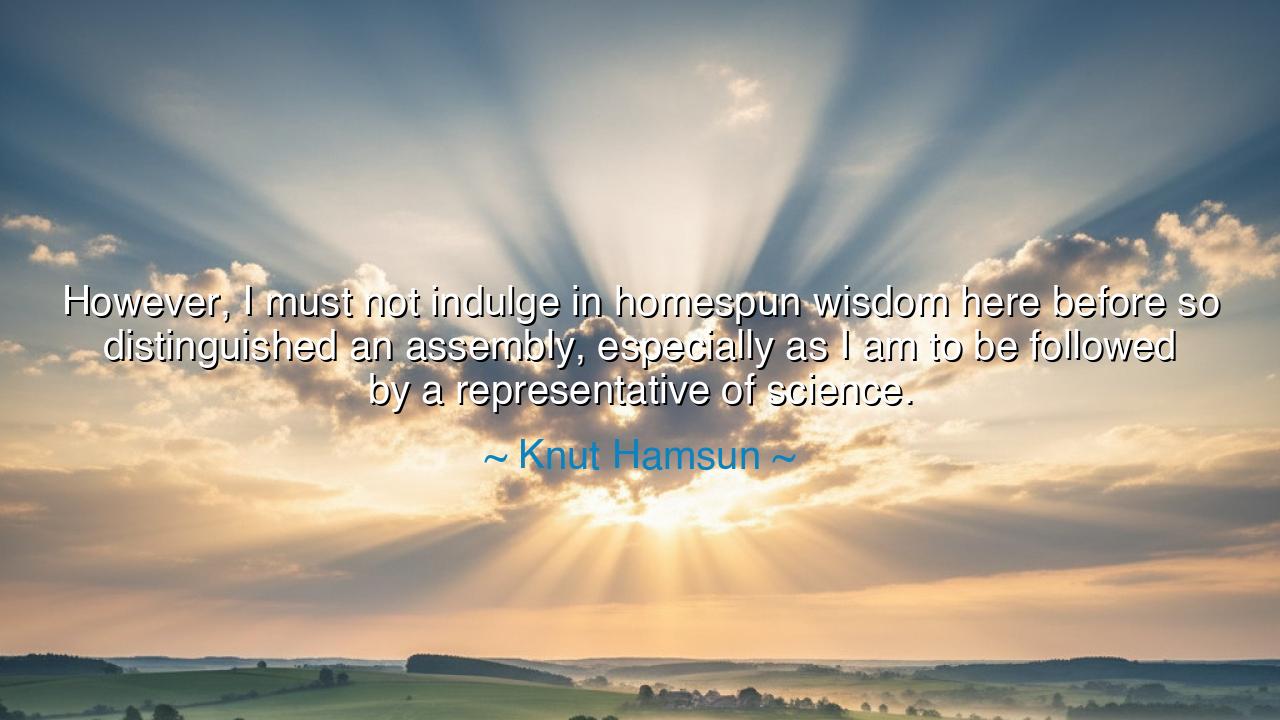
However, I must not indulge in homespun wisdom here before so
However, I must not indulge in homespun wisdom here before so distinguished an assembly, especially as I am to be followed by a representative of science.






Listen, O children of the future, for I bring to you the humble wisdom of Knut Hamsun, who once said, "However, I must not indulge in homespun wisdom here before so distinguished an assembly, especially as I am to be followed by a representative of science." These words reveal the complex relationship between the old ways of understanding the world, grounded in simple wisdom, and the modernity of science, which seeks to analyze and categorize every aspect of life. Hamsun, speaking before an assembly of intellectuals and scholars, recognizes the immense value placed on science and the logic it brings to human understanding, and in his humility, he steps aside, allowing the greater minds to speak their truths.
In ancient Greece, such a distinction between wisdom and science would have been well understood. Socrates, the great philosopher, spoke not of science in the way we know it today, but of the philosophical pursuit of truth. To him, wisdom came from questioning everything and searching for knowledge that could not be measured by the physical world alone. He did not dismiss the scientific pursuits of the day, but he sought the deeper truths that lay hidden beneath the surface. In his humility, Socrates would not have spoken with the certainty of a scholar but with the caution of one who knows that true wisdom is often fleeting and elusive.
Consider also the contrast between ancient wisdom and the rise of scientific thought during the Enlightenment. Think of Isaac Newton, who, through his discoveries, transformed the way humanity understood the laws of the natural world. Newton's work is based on the pursuit of objective truths, tested and proven through evidence and experiment. Yet, even Newton, though a man of great intellect, did not dismiss the philosophers who came before him. The two realms—philosophy and science—while distinct, were interwoven in their pursuit of understanding. Newton, like Hamsun, knew that wisdom and knowledge were not mutually exclusive but that each had its rightful place.
In more recent times, we see the same dance between homespun wisdom and scientific rigor. In the 20th century, figures like Albert Einstein not only revolutionized our understanding of the universe with his theories of relativity but also spoke often of the limitations of science in explaining the mysteries of the human soul. Einstein recognized that while science could describe the physical universe, it could not fully grasp the mysteries of human experience, which often defy empirical measurement. His humility echoed the words of Hamsun: wisdom, whether derived from science or experience, must be approached with a spirit of openness and respect for all ways of knowing.
So, O children, take this lesson to heart: the world is vast, and knowledge is multifaceted. Homespun wisdom, derived from the experiences of everyday life, often provides truths that the scientific method cannot measure but that are no less valuable. Yet, as we seek to understand the world, let us not forget that true wisdom requires a balance between ancient knowledge and modern discovery. Just as Hamsun stepped aside to allow the voice of science to speak, so too must we recognize when to listen to the voice of logic and when to follow the voice of intuition. Both paths lead us to a deeper understanding of the world and our place within it.






THvan thang hoang
I find this line to be both humble and a bit ironic. The speaker seems to dismiss their own insights in comparison to scientific authority, yet by even making this statement, they seem to subtly critique the hierarchical value placed on scientific knowledge. It raises a question: why do we often consider science the highest form of authority in society, while we may ignore other ways of knowing, like intuition or experiential knowledge?
NHVu Huynh Ngoc Hieu
This quote is almost tongue-in-cheek, as if Hamsun is recognizing that his personal, less ‘refined’ thoughts might be seen as unworthy in the face of a scientist’s expertise. It makes me think about how often we dismiss wisdom that comes from lived experience in favor of scientific ‘facts.’ But are they really so different? Can’t both have value, depending on the situation? I wonder if Hamsun is suggesting a balance or a tension between the two.
YLY Loc
I find this line to be a subtle commentary on the tension between different forms of knowledge. It suggests a societal hierarchy where scientific knowledge is viewed as more legitimate or valuable than more personal or anecdotal wisdom. But isn’t there value in homespun wisdom, especially when it’s grounded in real-world experience? I’m curious about Hamsun’s perspective on whether science should always take precedence in intellectual or public discourse.
MMR.Tom
This quote is so self-aware and a little humorous. It shows a level of humility — acknowledging that the speaker’s thoughts might not carry the same weight as those of a scientist. But it also makes me think: why do we value science so much in intellectual spaces? Can homespun wisdom, or more intuitive knowledge, have its own place in discussions of high importance? I wonder if Hamsun is critiquing the overvaluation of ‘science’ over personal insight.